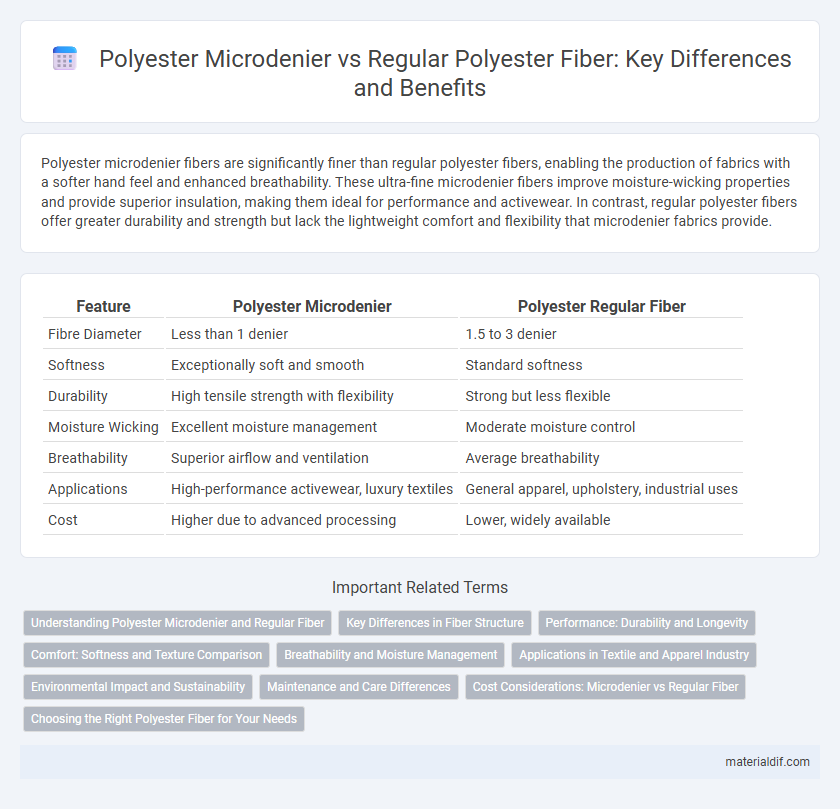Polyester microdenier fibers are significantly finer than regular polyester fibers, enabling the production of fabrics with a softer hand feel and enhanced breathability. These ultra-fine microdenier fibers improve moisture-wicking properties and provide superior insulation, making them ideal for performance and activewear. In contrast, regular polyester fibers offer greater durability and strength but lack the lightweight comfort and flexibility that microdenier fabrics provide.
Table of Comparison
| Feature | Polyester Microdenier | Polyester Regular Fiber |
|---|---|---|
| Fibre Diameter | Less than 1 denier | 1.5 to 3 denier |
| Softness | Exceptionally soft and smooth | Standard softness |
| Durability | High tensile strength with flexibility | Strong but less flexible |
| Moisture Wicking | Excellent moisture management | Moderate moisture control |
| Breathability | Superior airflow and ventilation | Average breathability |
| Applications | High-performance activewear, luxury textiles | General apparel, upholstery, industrial uses |
| Cost | Higher due to advanced processing | Lower, widely available |
Understanding Polyester Microdenier and Regular Fiber
Polyester microdenier fiber features significantly finer strands, typically less than 1.0 denier, compared to regular polyester fibers which usually range from 1.5 to 5 denier. This finer fiber diameter in microdenier polyester enhances fabric softness, durability, and moisture-wicking properties, making it ideal for performance apparel and high-end textiles. In contrast, regular polyester fibers are often used in more cost-effective applications like upholstery, home textiles, and general apparel due to their bulkier structure and lower production cost.
Key Differences in Fiber Structure
Polyester microdenier fibers are significantly finer than regular polyester fibers, measuring less than 1 denier per filament, which enhances softness and drapability. The smaller diameter of microdenier fibers allows for higher fabric density and improved moisture-wicking properties compared to regular polyester fibers, which typically have a diameter above 1 denier. This difference in fiber structure influences the textile's durability, breathability, and tactile feel, making microdenier polyester ideal for high-performance and luxury textiles.
Performance: Durability and Longevity
Polyester microdenier fibers exhibit superior durability compared to regular polyester fibers due to their finer filament structure, which enhances fabric strength and resistance to abrasion. These microdenier fibers contribute to longer-lasting textiles by maintaining shape and color retention even after multiple washes and extended use. Regular polyester fibers, while durable, tend to be less resilient to wear and pilling, resulting in reduced longevity over time.
Comfort: Softness and Texture Comparison
Polyester microdenier fibers, typically finer than 1.0 denier, offer superior softness and a smoother texture compared to regular polyester fibers that usually range from 1.5 to 3 denier. The reduced fiber diameter in microdenier polyester enhances fabric breathability and mimics the feel of natural fibers like silk or cotton, increasing overall wearer comfort. Regular polyester fibers tend to create a coarser texture, making microdenier a preferred choice for high-end apparel and performance textiles prioritizing comfort.
Breathability and Moisture Management
Polyester microdenier fibers offer superior breathability compared to regular polyester fibers due to their finer diameter, which increases fabric porosity and airflow. Enhanced moisture management is achieved as microdenier fibers wick sweat away from the skin more efficiently, promoting faster evaporation and dryness. These properties make microdenier polyester ideal for activewear and performance textiles requiring optimal comfort and hydration control.
Applications in Textile and Apparel Industry
Polyester microdenier fibers, with diameters less than 1.0 denier, provide enhanced softness, breathability, and drape compared to regular polyester fibers typically ranging from 1.5 to 3.0 denier. These microdenier fibers are extensively used in premium activewear, performance textiles, and intimate apparel where lightweight comfort and moisture-wicking properties are crucial. Regular polyester fibers dominate upholstery, outerwear, and durable workwear applications due to their strength and abrasion resistance.
Environmental Impact and Sustainability
Polyester microdenier fibers, being finer and lighter than regular polyester fibers, typically require less raw material per unit of fabric, reducing resource consumption and waste in production. Their enhanced durability and resistance to wear extend the lifespan of textiles, minimizing the frequency of replacement and thus lowering overall environmental impact. However, both microdenier and regular polyester contribute to microplastic pollution, with microdenier fibers posing a higher risk due to their smaller size and greater potential to shed during washing, challenging sustainability goals.
Maintenance and Care Differences
Polyester microdenier fibers require gentler washing cycles and lower drying temperatures due to their finer structure, which prevents damage and maintains fabric softness. Regular polyester fibers are more durable under standard machine washing and high-heat drying, making maintenance easier and less delicate. Choosing microdenier polyester enhances comfort but demands more careful care to preserve the material's integrity.
Cost Considerations: Microdenier vs Regular Fiber
Polyester microdenier fibers typically incur higher production costs due to their finer denier and specialized manufacturing processes, resulting in increased material expenses compared to regular polyester fibers. Regular polyester fibers offer more cost-effective solutions for bulk textile applications, making them favorable for budget-conscious projects without compromising durability. The choice between microdenier and regular polyester fibers ultimately hinges on balancing cost considerations with desired fabric softness and performance attributes.
Choosing the Right Polyester Fiber for Your Needs
Polyester microdenier fibers, typically measuring less than 1 denier per filament, offer superior softness, breathability, and moisture management compared to regular polyester fibers, which usually range from 1 to 5 deniers. Selecting microdenier polyester is ideal for applications demanding lightweight fabrics with enhanced comfort, such as activewear and high-performance textiles. In contrast, regular polyester fibers provide greater durability and wrinkle resistance, making them suitable for everyday apparel and home furnishings where strength and ease of care are priorities.
Polyester microdenier vs Polyester regular fiber Infographic

 materialdif.com
materialdif.com